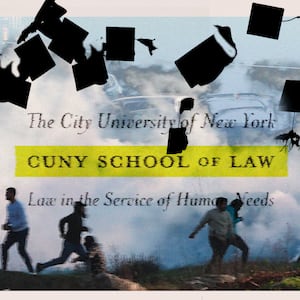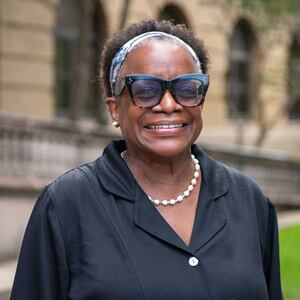The University of Texas at Austin recently removed two graduate teaching assistants from their positions for sending their students a message addressing a perceived lack of support for Palestinian students on campus. The decision is the latest instance, among many in recent months, of university administrations intervening in campus discussions on Israel-Palestine.
Callie Kennedy and Parham Daghighi, graduate students in the school of social work who led discussion sections for the course, “Women and Madness,” decided to craft the message in response to a student’s request. Kennedy told The Daily Beast that an undergraduate “asked for our class to address the mental health needs of Palestinian, Muslim, and Arab students” in light of the university’s apparent failure “to meaningfully acknowledge the needs of the student community.”
The student was articulating a sense of disappointment with the university shared by other Arab and Muslim students, particularly as tensions have escalated at UT Austin—and schools across the country—following Hamas’ Oct. 7 attack and Israel’s ensuing military actions in Gaza.
As Rich Schapiro reports at NBC News, many Arab and Muslim students feel let down by university leadership, specifically due to its response to an Islamophobic incident that occurred on Oct. 12 during a teach-in organized by the school’s Palestinian Solidarity Committee. Cellphone footage shows that three men, all unaffiliated with the university, accosted pro-Palestinian students at the on-campus event, calling them “fucking terrorists” and saying, “[N]ext week, I’m in Israel. We’re killing Arabs, motherfuckers.”
According to NBC News, the lack of consequences for the offenders and the university’s failure to address the incident directly “in any public statements or forums” have left Muslim students with the impression of a “double standard in how the university responds to acts of hate.” (The perception of asymmetry is reportedly heightened considering how the administration has, rightfully, responded to past incidents of antisemitism with prompt condemnation and increased security.)
Kennedy cited the university’s failure to issue an official statement “condemning the actions of the perpetrators [of the Oct. 12 incident] or assuring students of the university’s commitment to provide protection against incidents of violence and hate speech” as an example of the sort of neglect that motivated her and Daghighi to compose a message. Daghighi agreed, saying, “There was a gap in messaging that needed to be addressed, and all the more so because we were explicitly requested by a student on behalf of a larger population of students.”
So, the two graduate students say they brought the request to their supervising professor (who could not be reached for comment). “We drafted a message of support and resources for the student community, met with our supervising professor, and, together, all three of us reviewed and came to a consensus to send the message,” Kennedy told The Daily Beast. Daghighi, too, described the note as a “collaborative” effort between the three.

Protesters chant slogans during a rally in support of Palestinians at the Texas State Capitol in Austin, Texas, on November 12, 2023.
Suzanne Cordeiro / GettyPosted to a class communication platform with the subject line “Mental Health and the Violence in Gaza,” the message contained information about mental health resources available to UT Austin students, including some offered by the university’s mental health center and one specifically for Palestinians—an “identity-specific resource that we wanted to share with the student group who had approached us and asked for such a thing,” said Daghighi.
The message also criticized the administration’s “silence around the suffering many of our students, staff, and faculty are experiencing on campus,” specifically mentioning the university’s handling of the Oct. 12 incident. It concluded with an expression of support for “the rights and autonomy of Palestinians, Indigenous people, and displaced peoples across the globe, knowing that oppression results in trauma and negative mental health outcomes that can span generations.”
Six days after sharing this note, the two teaching assistants received letters from their dean, Allan Cole, officially removing them from their teaching assistant assignments.
Cole wrote that their message had been “unprompted,” “unacceptable,” “unrelated to the course,” and “inappropriate given the setting.” Students of Kennedy and Dahighi’s discussion section received an email from the university, provided to The Daily Beast by a UT Austin spokesperson, stating, “[W]e strive to address [controversial] topics with a balanced perspective… We also strive not to inject controversial issues into a course that are unrelated to the academic area of study. The posted message fell short of these standards.”
While Cole assured the graduate students that they were not being fired, and will be offered employment for the spring 2024 semester, he also explicitly noted that they will not be reassigned as teaching assistants.
The two graduate students, however, wish to return to the classroom.
“Our request was to be reinstated in full as teaching assistants, as that’s the work that both of us are most comfortable doing,” Daghighi told The Daily Beast. “After five semesters of being teaching assistants—the both of us, we’re most qualified to do that work.” Kennedy added that the administration’s failure to reinstate them to their previous positions “continues to function as a punishment and continues to constitute censorship insofar as we are not being permitted to continue teaching in the classroom.”
In an email to The Daily Beast, Pauline Strong, president of the UT Austin chapter of the American Association of University Professors (AAUP), said that, though Kennedy and Daghighi still remain employed by the university, their removal from their teaching roles “still violates principles of academic freedom and due process.”
In a Nov. 26 letter to UT administrators, the university’s AAUP chapter shared concerns about the graduate students’ removal from their roles, which, the organization says, not only violated academic freedom but also failed to follow university policies and procedures on disciplining teaching assistants.
In a statement provided to The Daily Beast, a UT spokesperson stood by the university’s decision, writing that the administration “appropriately managed” the situation, in which the teaching assistants “unprofessionally misused the official University classroom communication platform to send a personal political message to the students in a course.”
But while the university’s statement challenges the suggestion that the “message was merely an attempt to share mental health resources and that the content of the message was related to the course,” Kennedy and Daghighi insist that it was neither inflammatory nor irrelevant to the course’s content.

A protester weeps looking at the names of deceased children typed on a scroll during a rally in support of Palestinians at the Texas State Capitol in Austin, Texas, on November 12, 2023.
Suzanne Cordeiro / GettyThe graduate students emphasized that the majority of resources shared were available to all students—the sole exception being the one tailored to the identity group of the student who initially requested support. And, contrary to the administration’s charge, they maintain that their message was germane to the subject matter of the course, which focuses on mental health, psychiatric history, and the effects of institutional harm on the oppressed.
It was particularly appropriate to send a message highlighting campus resources, Kennedy added, because “Women and Madness” is a “signature course,” designed to teach first-year students about campus resources the university has to offer.
The two also explained how their decision to write the message was informed by the training they have received in their graduate program, specifically citing a standard in the National Association of Social Workers Code of Ethics stating that “[s]ocial workers should act to expand choice and opportunity for all people, with special regard for vulnerable, disadvantaged, oppressed, and exploited people and groups.”
“We were trying to do just that,” Kennedy said.
While it is surely a difficult moment for university leaders, as the AAUP elucidated in a recent statement, polarizing times require universities to remain firm in promoting open inquiry and discussion.
And, amid increases in antisemitism and Islamophobia, college administrators must also ensure that all community members impacted by the ongoing violence in the Middle East and its reverberations receive the institutional support they need. According to Kennedy and Daghighi, their message was an effort to make up for a believed inadequacy on this front at UT Austin. It was also solicited by a concerned student, and Kennedy and Daghighi say it was reviewed, to some extent, by their supervising professor.
That considered, it appears that the message should have been afforded broad academic freedom protections. Unfortunately, it was instead suppressed under the wave of censorship—particularly of pro-Palestinian speech—lately sweeping college campuses.










